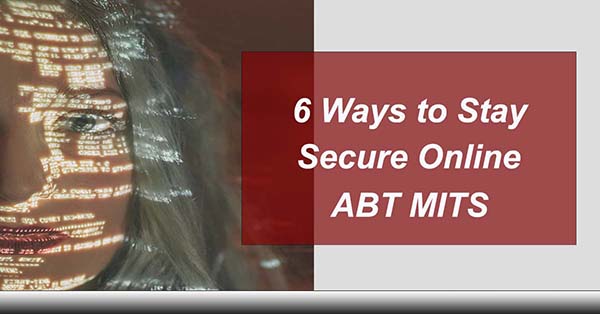6 Ways to Stay Secure Online
Only hook up to network that you know.
Free Wi-Fi is tempting, especially as your venture into remote work, be sure that you deeply consider where your internet connection is coming from. Public connections at the local coffee shop, from apartment buildings, and public areas in general are usually unsecured and leave your devices open to outsiders. While these networks provide a convenience, there are risks to be aware of.
Bank & shop with caution.
Limiting your shopping to familiar websites is a good place to start. Stick with the reputable sites that are tried and true – like Amazon or eBay. Also, before checking out and offering your banking information, look for the ‘padlock’ symbol or the abbreviation ‘https’ in the address bar at the top of your browser. This is your trust signal that you are on a secure, encrypted part of this webpage. Routinely check your bank statements for suspicious activity, and audit your team’s statements for abnormalities too.
Use secure passwords.
Passwords for logging into any website should contain a mix of letters, numbers, and special characters – as well as be different for each website that you log into. It can help to create a phrase string which is more challenging to hack. It can definitely be a pain to remember all of these passwords, but ask yourself which is more of a pain – remembering these, or recovering stolen personal information.
Lock your computer.
When you walk away from your machine, always lock it. In Windows, it is as easy as pressing the Windows key + L. On an Apple Mac, pressing “Control+Shift+Eject” will do the trick (unless you do not have an optical drive, then you can hit the “Power” key instead of “Eject”). This practice would be the equivalent to dead bolting the front door of your home. It acts as a deterrent to the bad guys as well as a line of defense. It keeps interoffice private information secure. It may even be worth setting up a password lock on your Apple or Windows machine as well.
If it feels off, don’t click it.
Common sense is key. If an offer is too good to be true, it probably is. If you get an email from an unknown source, don’t click any of the links within it – and immediately report it to your IT department. If a window pops up while browsing a website, immediately close it. If someone sends you a request that is out of character, follow up with questions. Familiarity is always your friend. Using your judgment and trusting your gut is the ultimate defense when online. Always play it safe!
Don’t share your login information.
With today’s resources, there’s no reason to share your login information. Collaboration tools are everywhere allowing for you to store and collaborate on projects from the cloud. Some are even free. Teach your team to operate from the cloud and reduce the number of people who require your login information to yourself.
